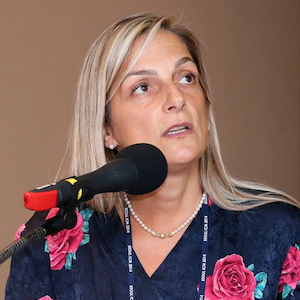
ERC: Gabriella Pinzari
![]() Project: StableChaoticPlanetM - Stable and Chaotic Motions in the Planetary Problem (2016-2021)
Project: StableChaoticPlanetM - Stable and Chaotic Motions in the Planetary Problem (2016-2021)

ERC Grantee: Gabriella Pinzari
Department: Mathematics
Total Contribution: Euro 900.000,00
Project Duration in months: 60
Start Date: 01/03/2016
End Date: 28/02/2021
Gabriella Pinzari is Associate Professor of Mathematical Physics at the Department of Mathematics.
She completed her master degrees in Physics (1990) and in Mathematics (1996) at the University of Roma “La Sapienza” and her PhD in 2009 at the Roma Tre University. She was then postdoctoral fellow at the University of Napoli Federico II (2009-2011) and at the Roma Tre University (2011-2013). From 2013, she became Assistant Professor at the University of Napoli Federico II and from 2017 Associate Professor at the University of Padova. Her research fields include planetary n-body problem, perturbative theories and techniques in celestial mechanics, and Hamiltonian systems. She collaborated in many national and international projects, including two ERC grants (HAMILTONIANPDES and hamPDEs) on Hamiltonian PDEs. In 2014 she was an invited speaker at the International Congress of Mathematicians in Seoul, for the results she found in her PhD dissertation, where she obtained, for the first time, a constructive proof of a famous statement by V.I.Arnold, going back to the 60s, on the stability of planetary systems. Those are systems of particles (one of which much larger than the others) interacting via gravity only and actually modeling our Solar System. Her contribution consisted in the production of a system of canonical coordinates which allowed her to overcome without artificialities the deep degeneracies of the problem. Such coordinates were based on a technical issue acknowledged to A. Deprit, that, even though existing since the 80s, had never been considered since then, and that she had rediscovered independently during her PhD. In 2015 she won an ERC Starting grant for her project (2016-2021) on the planetary problem.


